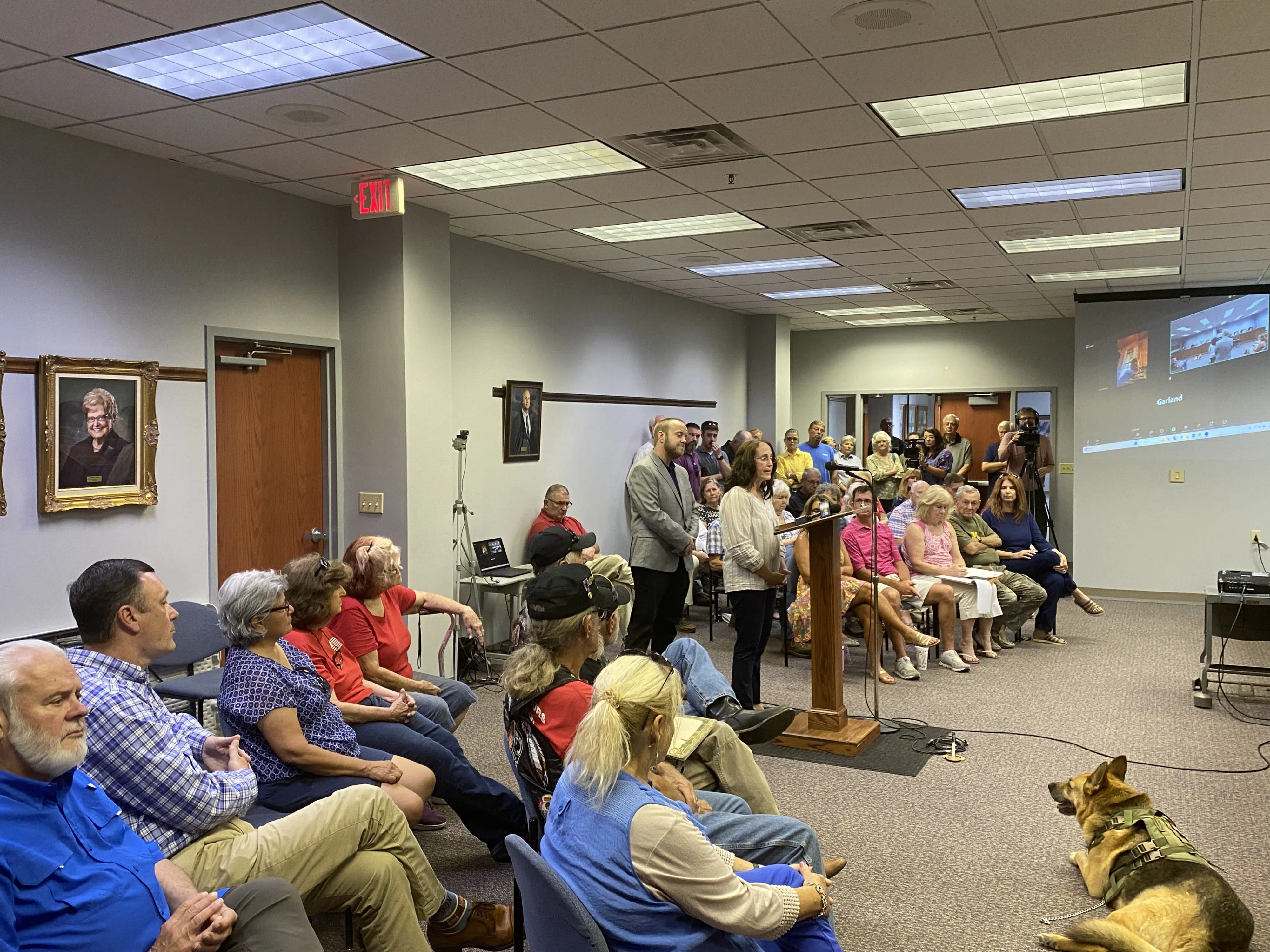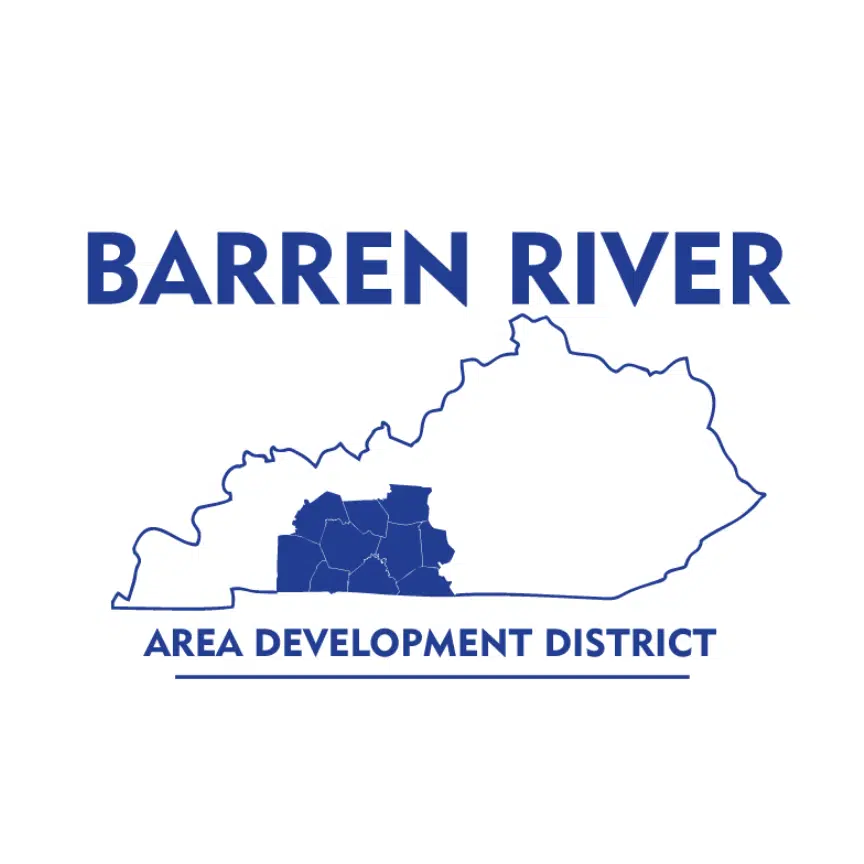
Refugee Bowling Green representatives Matthew Stevens and Alice Tarnagda stand before the Barren County Fiscal Court on July 8 amidst a full room of Barren Countians, some of whom spoke at the special-called meeting and shared their concerns for the 30 individual refugees looking to reside in Barren County. Michael Crimmins/Glasgow News 1.
By MICHAEL CRIMMINS
Glasgow News 1
In what is likely to become the most well-attended Barren County Fiscal Court meeting of this year, the magistrates had an “open public discussion” on the proposed residency of 30 individual refugees — not 30 families as one member of the public who spoke suggested — within Barren County.
The fiscal court had other items on the special-called meeting agenda like the memorandum of understanding with the Barren River Area Safe Space but that item, and the two other business items, were quickly dealt with roughly three minutes into the meeting. After which time Barren County Judge-Executive Jamie Bewley Byrd invited Matthew Stevens, a local mortgage lender who works with Refuge Bowling Green and who spoke at the June 24 Glasgow Common Council meeting, and Alice Tarnagda, co-founder of the nonprofit, to speak and clear up some of the misinformation related to the proposed residency.
“I know this was a very talked about meeting,” Byrd said. “We do ask as much as possible to be professional…everybody wants the best for Barren County and we’re going to have a very civilized meeting; I know we can do that.”
Largely Stevens and Tarnagda’s explanation was a regurgitation of the one given at the June 24 Glasgow Common Council meeting. Refuge Bowling Green is a “locally founded and community driven” nonprofit “that helps refugees thrive in their new home” by providing English and driving courses, occupational search assistance and recreational services. During the roughly 90 minute meeting it was also emphasized that the nonprofit worked with local churches and is not a “resettlement agency” like the International Center in Warren County.
“Refuge Bowling Green is not a resettlement agency,” Stevens said. “There are some [organizations] that this is all they do and it’s all they do but that’s not us.”
“This is a special program that’s called a remote placement program…for 30 individuals,” Tarnagda said.
Prompted by questions from Byrd, Stevens also said the 30 individual refugees — which is defined as “a person who has been forced to leave their country in order to escape war, persecution, or natural disaster” — are fully vetted as typical of the process. He further said they would be given a one-time fund of $1,300 funded through “individuals, corporations and federal grants.” He added that the refugees would not be eligible for the Section 8 housing program and therefore there would be no competition.
“Housing that’s available to the refugees is housing that is currently available for rent,” Stevens said. “There is no competition between Section 8 recipients and refugees.”
Each magistrate, with the exception of Tim Durham, asked questions of the two representatives. Magistrate Marty Kinslow asked why Barren and not Warren County, to which Tarnagda explained it was akin to a remote college meaning because Warren County already had a resettlement agency, and Refuge Bowling Green being a special program and having no intention of creating a new resettlement community, that Barren County was picked. This was coupled with the county’s thriving Latino community — as the 30 individuals would be coming from Latin American countries — and “welcoming” attitude, Stevens added.
Magistrate Jeff Botts asked about the demographics of the refugees to which they responded that they were unsure at this time of the specifics.
“What we do know is that these 30 individuals have been in a refugee camp for a substantial amount of time; they’ve gone through the normal refugee process, and so that aspect is the standard,” Stevens said.
Magistrate Brad Groce asked about the strain on the schools, which Tarnagda said was “relatively low” given that children had to be brought with a parent and, having only a 30 individuals pool, likely comprised a small portion.
“One of the things we did look at…is what the school systems already had,” she said. “These new children — these new families — would fall under the already existing categories that are already there [in the schools].”
After all magistrates had asked their questions, Byrd opened the special-called meeting to public discussion on this topic. Public comments were limited to a maximum of five minutes unless someone yielded their remaining time to another.
Michelle Snyder, a self-proclaimed “refugee” from the West, spoke in opposition to this residency given the national circumstances.
“I don’t think this would have been a problem three or four years ago but because of the trajectory of what’s going on [it is],” Snyder said. “We don’t trust our government at the moment so why would we trust an illegal, a migrant, or a refugee? They’re putting labels on everything that really mean nothing…so I’m sorry we’re not more supportive of this but we have to be responsible…and I think it’s irresponsible”
David Dickerson, who was Barren County Judge-Executive from 1994 to 1999, came to the podium and spoke about fixing the unmet needs of the county before taking on another “potential problem.” He also recommended to Stevens and Tarnagda that they go to each magisterial district and ask the people there their thoughts on the residency.
Dickerson ended by asking the Barren County Fiscal Court to put a motion on one of their future agendas showing their nonsupport for the refugee residency.
“We can’t allow this to happen,” Dickerson said. “Not on the basis of ‘ifs’ and ‘maybes’… the unknown is the problem. We do not need to face that as Barren County…I would beg you to stop this, I have no authority other than to beg you to stop this.”
Local pastor Mike Padgett spoke asking for information both from Refuge Bowling Green and from veterans and those in Barren County who needed help as did Ernie Wagoner.
Among questions asked included “what would happen if the refugee got in trouble” to which came the reply that they would be under the law and if the 30 individuals would be trying for American citizenship, which, according to Stevens, most are.
Most of the questions posed and the arguments made by the public served more as an indictment on the U.S. government — issues such as veteran care, public transportation, medical care and the immigration process — than on the refugees themselves.
In the end no action was taken by the fiscal court other than, as Byrd put it, “clearing up things.”
“We have nothing to do with where these people are placed,” Byrd said. “We have nothing to do with funding; the county and the city have no involvement in this at all.”

Comments